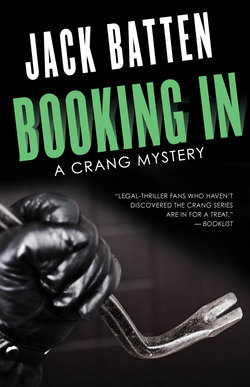Читать книгу Booking In - Jack Batten - Страница 7
На сайте Литреса книга снята с продажи.
Chapter Three
ОглавлениеMaury was still an attractive guy to women who were into the rough-hewn look. The lines that bracketed his jaw were deeper than they’d been a dozen years earlier, his hair had gone silver, but his posture was still erect, his eyes clear, his voice sardonic. This morning he had on a lightweight suit in a shade that was usually called “wheat” in fashion magazines. His shirt was dark blue in a shade like mine. The shirt and the suit bore more wrinkles than Maury usually permitted.
“You ought to keep a change of clothes at Sal’s place,” I said. We were walking south on Major, on our way by foot to Fletcher Marshall’s store a few blocks away on College Street.
“I look that bad?” Maury said, his head turned down to study his suit.
“It’s more a case of you establishing a reputation all these years for fastidious attire. Which you’re not showing this morning.”
Maury made a grunting sound. He brushed at his jacket with his left hand, as if he could banish the wrinkles. In his right hand he was carrying a black bag more suited to a medical doctor than a former second-storey man.
“What’s with the bag?” I said.
“For carrying break-in equipment.”
“You’re coming out of retirement?”
“Consultation purposes only. This is an idea Sal came up with a while ago for something to do with what she calls my idle hours. Advise businesses on how to avoid guys who made their living the way I used to.”
“Stuff for show-and-tell, that’s what’s in the black bag?”
“Sal put a stethoscope in there, a pair of tight white gloves for handling evidence. I got a tablet-type computer thing from Apple. I’m equipped, man.”
“Impresses the heck out of me.”
“Some of it’s bullshit. Back in the day, I was strictly a guy who got through the doors. I could pick a lock with the best in the business. But cracking open safes, I knew a lot theoretically, but that was never a strong point with me.”
Maury and I had reached Harbord Street. We walked a block west to Brunswick, waited for the light to change, then crossed Harbord. We kept going farther south down Brunswick past the lovely old three-storey Victorian houses. The sun was hard and bright, the air not nearly as humid as it had seemed when Fletcher’s phone call started my day. I felt light-hearted, just a guy out for a stroll in his own neighbourhood with a friend who was revisiting his history in burglary.
“The way I always understood it,” I said, “you were the guy who went into hotel suites in the middle of the night, the guests asleep in there, and when you left the suite, it was with the guests’ valuables.”
“It was my role.”
“Sounds risky.”
“It was a career I trained for.” Maury sounded indignant. “I was the sneak thief, the guy in the Bally shoes that never squeaked, the friggin’ burglar.”
“Very dangerous enterprise, I would still have to say.”
“How many times I got to tell you I never got caught? Not once in thirty years.”
“I recall you saying.”
“Only time I was ever busted on a break-and-enter, a Holiday Inn out on Eglinton Avenue right here in the city, I wasn’t the guy who went into the hotel room.”
“You were waiting in the car out in the parking lot while your partner handled the burglary duties inside. The trouble was, the husband of the couple in the room woke up, and bad things ensued. You told me about this calamity when we first met.”
“The cops took me downtown, me and my partner, a guy name of Abbey Marcoux, that bungled the entry.”
“Convicted at trial, confirmed on appeal. I read the appeal judgment.”
“Two years in the can up in Kingston.”
Maury’s face took on a morose look. He slowed his walking pace while I waited patiently for him to rally from his small sad reverie.
We had reached a park on Brunswick just above College. The park was small, green, and nicely looked after. I motioned Maury to a bench facing the park. It was twenty minutes to ten, and we were only five minutes away from Fletcher Marshall’s store. There was time to dally. We sat on a bench beside a sign reading “Margaret Fairley Park.”
“Ever heard of this Margaret Fairley broad?” Maury said, sounding brighter.
“She was a Coleridge specialist,” I said. “I read that in a book about the neighbourhood. And she edited a communist magazine.”
“That was what got the park named after her?”
I shook my head.
“Margaret lived in a house on this block where we’re sitting.” I said. “Everybody thought she was a generous neighbour.”
Maury’s expression told me he wasn’t convinced. Since I knew there would be no persuading him, both of us went amiably quiet for a few minutes.
Then Maury looked at his watch. “Time we got to the gig,” he said.
